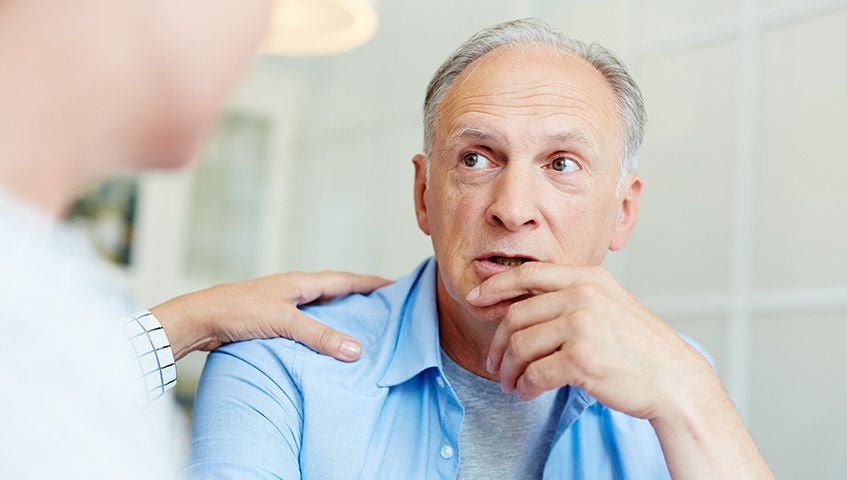Coping with Your Changing Body After Cancer Treatment

Cancer treatment may be over, but for many cancer survivors, there are some lasting effects on the body. Both men and women may experience physical changes that can affect their self-esteem. Find out what you can try as you cope with these physical changes that often affect our mental outlook.
Cancer Can Have a Long-Term Impact on Your Body
Depending on the type of cancer, the treatment process may have changed your body in very noticeable ways, some of which are permanent, some of which may not be permanent but could be evident for months or even years. All of these changes can impact your self-esteem and confidence while you learn to adjust and accept what’s new for your post-treatment body.
Some of the most common permanent and long-term physical changes survivors must learn to cope with include:
- Scars from surgeries or the loss of a limb, breast or other body parts that may have been removed.
- Changes in your hair’s texture and color after cancer treatment
- Ostomy (an opening created in the body so wastes can be collected in a bag)
- Loss of muscle tone as a result of inactivity. This is sometimes referred to as atrophy (at-tro-fee).
Other physical changes are side effects of medications used to treat your cancer, including:
- Weight gain from medications or restrictions limiting physical activity
- Weight loss from medications or loss of appetite,
- Changes to skin tone.
These changes may not be long-lasting if you eat a healthy diet that includes good fats, lean proteins, and vegetables, and increase your level of physical activity to build muscle.
How to Cope with Changes to Your Body
People who have not experienced cancer and the physical changes it causes may not understand a survivor’s struggle with body image. It’s easy for people who have not walked in your shoes to assume that you should be grateful you survived your illness and that you shouldn’t worry about how your body looks. The truth is, if you cared about your appearance before getting cancer, you’re more than likely still going to care about it after going through cancer.
Having cancer does change people; many survivors emerge with a new perspective on what is and is not important in life. If you can learn to focus on the positive aspects about your body (not the least of which is that it is free from cancer), you’ll probably spend less time mourning physical changes you’re not happy about. If you are feeling self-conscious about aspects of your appearance, the following advice may help.
- First and foremost, even if your body looks different, you are the same person on the inside. People who loved you before cancer will continue to love you and your post-cancer body!
- Be gentle with yourself. Allow yourself to grieve your pre-cancer body so you can eventually move past those normal feelings and begin to get used to your new body.
- While time does not heal all wounds, it can soften them. Some physical changes (such as hair loss, weight gain, or weight loss) may go away eventually. Others (such as scars) may become less noticeable over time.
- When you are ready, research possible reconstructive surgery, cosmetic solutions, and/or prosthetics that may be able to help you look more like your pre-cancer self.
- Share your feelings with other survivors who may understand what you’re going through. Simply having your feelings validated can be helpful in some situations. Plus, those who have experienced similar changes can share their experiences and suggestions for ways to cope.
- Understand that curiosity is natural and be prepared for questions about your appearance. Friends, relatives, co-workers, and even strangers may ask questions. Decide how you’ll respond if people want to talk about changes to your appearance (if you don’t want to talk about these changes, simply tell them you’re not ready to discuss that.)
- Highlight the positive. You can still do things that make you feel attractive! Depending on your unique physical situation, you can still get a manicure or pedicure; experiment with a beard, mustache, or goatee; buy some new wardrobe items to accommodate changes to your body; have a makeover; try out new hairstyles, wigs, toupees, and/or hats; upgrade your eyeglasses; wear fun jewelry; etc., to draw attention to what you do love about your appearance.
If you can’t seem to get past feelings of sadness, inadequacy, or anger about your appearance, talk to your cancer care team and/or seek help from a professional counselor. At Virginia Oncology Associates, we have two oncology social workers that are here to help guide you through life after cancer, including coping with your new body. The Look Good Feel Better program is also present in Virginia, and this American Cancer Society program is a free, public service support program that helps people with cancer deal with the appearance side effects of cancer treatment. In some cases, antidepressant medications may be able to boost your mood during the adjustment period.

